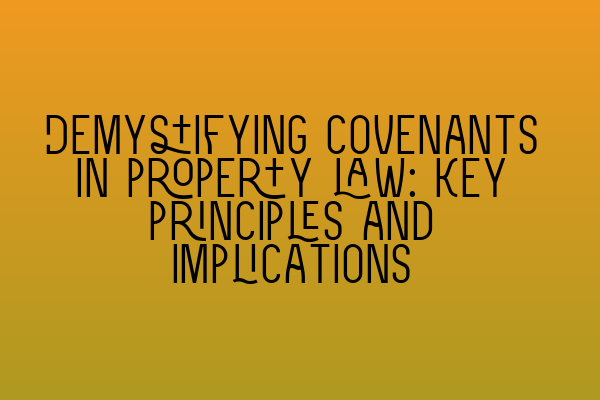Demystifying Covenants in Property Law: Key Principles and Implications
Welcome to the SQE Property Law & Land Law blog! In this comprehensive guide, we will demystify the often complex and confusing topic of covenants in property law. Whether you are studying for your SQE exams or are a practicing solicitor, understanding the key principles and implications of covenants is essential in navigating property transactions effectively.
Before we delve into the nitty-gritty details, it’s important to define what a covenant actually is. In property law, a covenant is a legal agreement between property owners that imposes certain rights and obligations on the parties involved. These covenants are usually found in land titles and can have long-lasting effects on the use and enjoyment of the property.
Types of Covenants
There are two main types of covenants: positive covenants and restrictive covenants. Positive covenants require the owner of the property to do something, such as maintain the property or contribute to the maintenance of shared facilities. Restrictive covenants, on the other hand, limit or prohibit certain activities on the property. For example, a restrictive covenant may prevent a property owner from building certain structures or using the property for specific purposes.
It’s important to note that covenants can be either expressly agreed upon by the parties involved or implied by law. Express covenants are specifically included within the legal documents, such as a lease or a land transfer. Implied covenants, on the other hand, are not explicitly stated but are implied from the circumstances or the relationship between the parties.
Enforcement of Covenants
Enforcement of covenants can be a complex and contentious issue. The remedies available for breach of covenant depend on various factors, such as the type of covenant, the wording of the covenant, and the specific circumstances of the case. In general, remedies can include damages, injunctions, or specific performance.
When it comes to enforcing covenants, it’s essential to carefully consider the legal challenges that may arise. Our comprehensive guide on Legal challenges in property transactions provides invaluable insights into dealing with potential hurdles.
Principles of Interpretation
Interpreting covenants requires a thorough understanding of the key principles that guide the courts in their decision-making process. These principles include the intention of the parties, the plain-meaning rule, the rule against perpetuities, and the doctrine of privity of contract. Familiarizing yourself with these principles is vital for correctly interpreting the implications of covenants.
Implications for Property Transactions
The presence of covenants can have significant implications for property transactions. When buying or selling a property, it’s crucial to identify any existing covenants and understand their potential impact on the property’s value and use. Failure to address covenants adequately can lead to legal disputes and financial consequences.
Moreover, covenants play a crucial role in environmental ethics and sustainable development in land law. By balancing development with sustainability, covenants can help protect the environment and ensure responsible land use. Our article on Environmental Ethics in Land Law explores this topic in greater depth.
The Art of Drafting Covenants
As a solicitor, you may find yourself involved in drafting covenants for property transactions. It’s essential to have a strong understanding of the legal principles and requirements to ensure that the covenants are clear, enforceable, and achieve the intended objectives. Our guide on Dominate Property Law Questions: Avoiding Common Pitfalls provides valuable tips for successfully navigating the complexities of property law.
Final Thoughts
Covenants are a fundamental aspect of property law that can have far-reaching implications for property owners and transactions. By understanding the key principles and implications of covenants, you can confidently navigate property transactions and provide expert advice to your clients.
For further guidance, our extensive collection of SQE case studies in property law offers real-world scenarios that will help you apply your knowledge in practical contexts. Plus, don’t forget to check out our Land Law Revision Tips to ace your exam preparation!
Thank you for reading our blog post on demystifying covenants in property law. If you have any questions or need further assistance, please feel free to contact us at SQE Property Law & Land Law. We are here to help you succeed in your property law journey!
